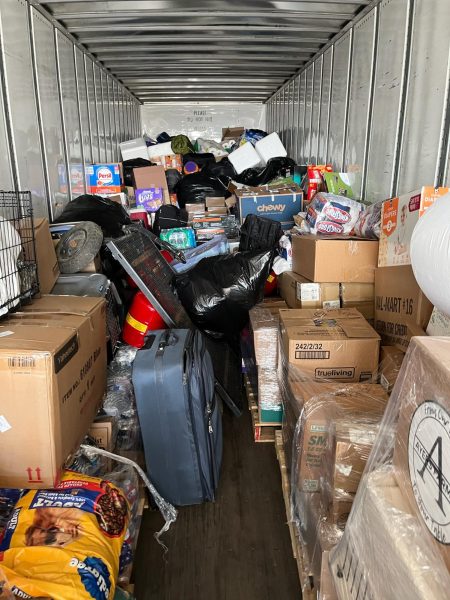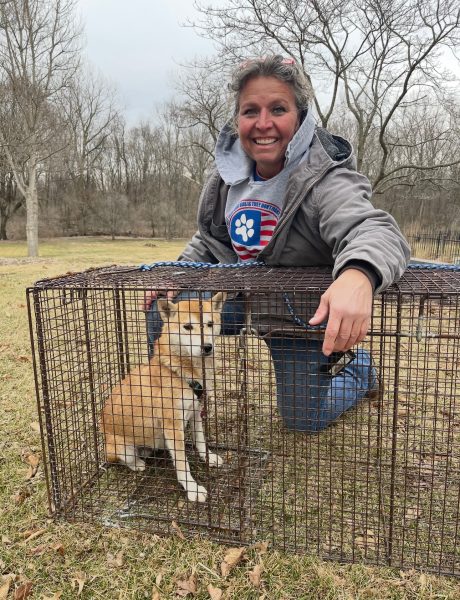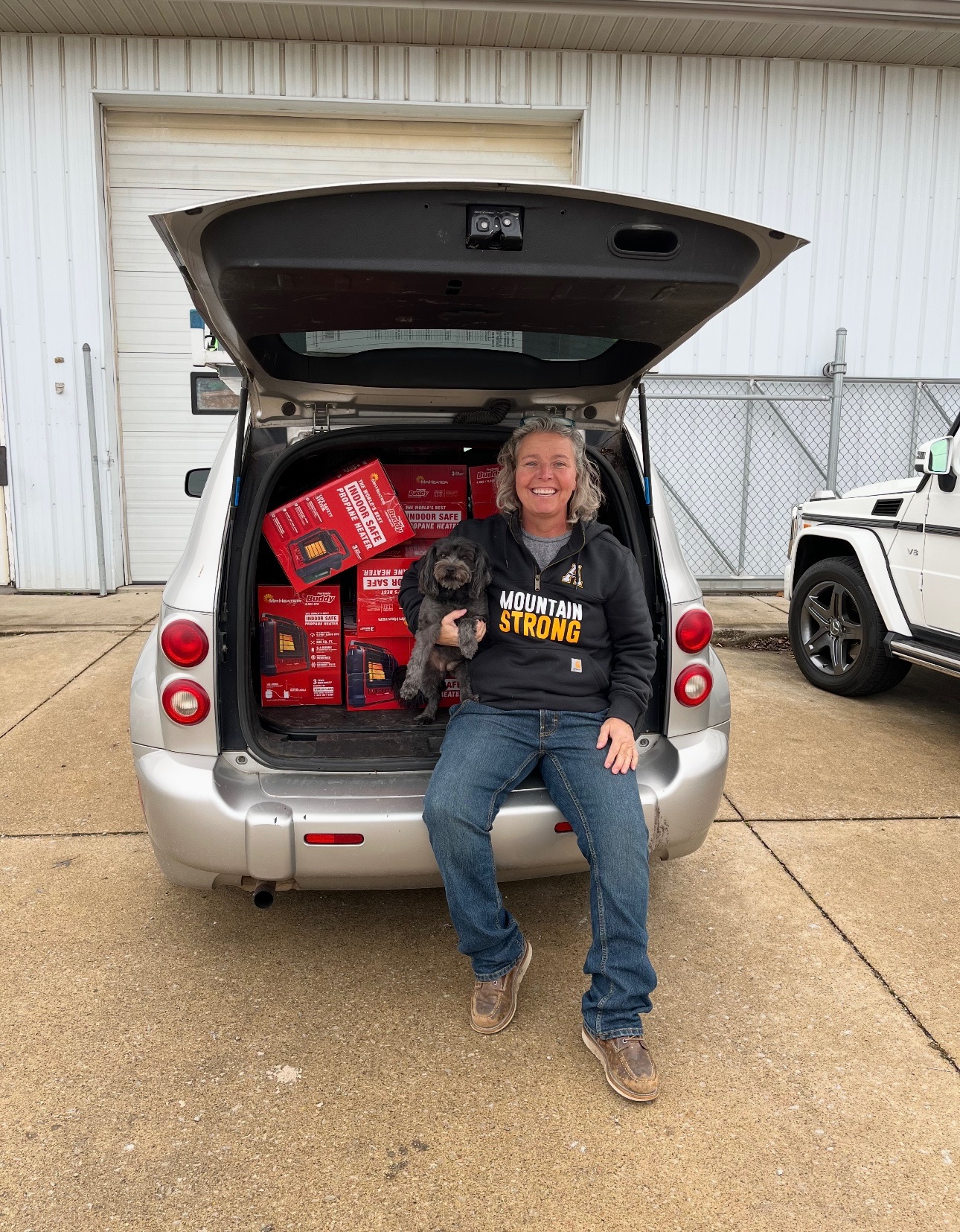As Hurricane Helene raged on, devastating some areas of Western North Carolina, one legend within the dog rescue community of Illinois answered the call for help.
Charlene Powers Walsh has volunteered during several natural disasters, including Hurricane Harvey and Hurricane Katrina. When she heard about Hurricane Helene and its impact on Western North Carolina, she knew what she needed to do.
“I work as a volunteer for WILD Canine Rescue,” she said. “And so I just had a conversation with the board of directors and the local volunteers with our group and said, ‘Hey, would anybody be interested in donating if I could get together transport for a load of goods to take to Western North Carolina and East Tennessee?’”
Walsh owns a 16-foot livestock trailer she uses to transport goods during her volunteer work. Two days after she reached out to the organization, her trailer was filled to capacity with donated supplies.
Soon she said she could no longer fit more donations in the trailer. She called a friend, Eric Doyle, who is a farmer, asking if he could loan out his semi-truck.
“He’s never told me no,” she said. “This is the third hurricane that he’s helped me in.”
In mid-October, Walsh and Doyle transported an estimated 40,000 pounds of supplies to Western North Carolina, from bottled water to animal feed to propane heaters. When she arrived, Walsh said she couldn’t see the impact of Hurricane Helene due to it being dark outside.

Walsh and Doyle unloaded their supplies and returned to Illinois. After she returned home, she said she could not stop thinking about Western North Carolina and the destruction caused by the storm.
At the time, Walsh owned a retired 53-seat passenger school bus she named True Grit, which she converted into a dog bus by reorienting the windows, removing the seats, adding a heating system and installing benches. She decorated the exterior sides of it with paw prints, allowing those who donated to the rescue organization to place the name of their pets inside them.
“I was looking outside one day and I’m like, ‘you know, maybe there’s a use for that bus in North Carolina,’” she said.
Walsh took to Facebook to ask members of local Western North Carolina groups if they would have any use for the bus. She said she was shocked by the “tremendous” response of people inquiring about it.
“The stories and the dreams of what people thought that they could do with the bus was almost overwhelming,” she said.
Eventually, Walsh decided who she would donate her bus to Nanda De Medeiros, who Walsh said had lost everything during the storm. De Medeiros, like Walsh, is also a dog lover and volunteer. Coupled with the fact that she knew how to drive a bus, Walsh felt she was the perfect recipient.
“After Helene, I had a hard time finding a place to live,” De Medeiros said.
De Medeiros volunteered her time delivering supplies and working at distribution centers after the storm when she came across Walsh’s post.
“I said, ‘Oh my gosh, that’s a match made in heaven,’” she said.
After speaking with De Medeiros, Walsh started planning her trip back to Western North Carolina. She decided she would haul the bus rather than driving it during the several-hour-long trip. Just before she left, she had an idea.
“I got to looking around and I’m like, ‘Why would I take an empty bus?’” she said. “If I’m going to take a bus, let’s fill it up.”
Walsh filled the bus with her own collection of tools in hopes of providing resources to residents rebuilding after the storm. She packed in kerosene and propane heaters, and after consulting again with the rescue organization she volunteers for, was able to contribute more tools and appliances.
Additionally, Walsh worked with donors to purchase Thanksgiving meals for impacted families in Western North Carolina.
With the help of local volunteers Mark and Karen Stovers, Walsh purchased over 100 meals from multiple Aldi locations and distributed them at a center in Burnsville during her second trip to the area.
The Monday before Thanksgiving, Walsh traveled to Grandfather Campground, which was also near a resource hub at the time, and met up with De Medeiros, where they then offloaded supplies at the hub.
Walsh also used her expertise in dog rescue during her trip to trap and locate lost dogs.
Walsh said during times of natural disasters, families sometimes have to make difficult decisions when it comes to finding temporary housing that might not allow pets.
After trapping any lost pets she came across, she said she tried to reunite them with their families, or get them to a safe location, either with fosters, rescues or animal shelters, where they can be cared for.
She stopped in Boone for a night to rest, and said despite the destruction caused by the storm, found the area to be very “beautiful and mountainous” and filled with “amazing” people. After stopping to buy an App State hoodie, which her friend later added the words “mountain strong” to, she returned home to Illinois.
But after returning from her second trip to the area, Walsh said she still couldn’t stop thinking about Western North Carolina. She said her husband purchased a used car a couple of years prior that wasn’t being used and once again inquired on Facebook, seeing if anybody would have a use for the car.
“And once again, the response was overwhelming,” she said.

Walsh collected the names of everybody who responded to her post and placed them in a bowl, enlisting the help of her rescue dog Wanda to select a recipient. She said she threw a small piece of a hot dog into the bowl, which Wanda retrieved, along with a slip of paper with the winner’s name written on it.
Walsh said she couldn’t have picked a better recipient of the car and started preparing for her third trip to North Carolina. And once again, she came up with another idea.
“I’m not going to take an empty vehicle out there,” she said.
Using her own funds and funds from donors, Walsh stuffed the car with over 50 heaters, ratchet strapping some to the top of the car, carrying as many as she could.
Walsh distributed the heaters and more supplies during her third trip in mid-December, meeting up with the recipient of the car she donated, as well as De Medeiros, the recipient of the bus.
“I truly live to try and put a smile on peoples’ faces,” Walsh said.
Walsh is planning her next trip to the area in May with some of her friends to conduct river clean-ups.
De Medeiros works with rescue animals, taking them out of shelters and placing them in homes. She hopes to use the bus as a way to offer volunteer dog training services to the community, in addition to providing a safe space for her dogs and herself to live.
“We are a pack,” she said.
Correction: A previous version of this story contained a description in which the source has requested to remove. This description has been removed.



Teddy Edwards • Feb 12, 2025 at 9:55 pm
Great story